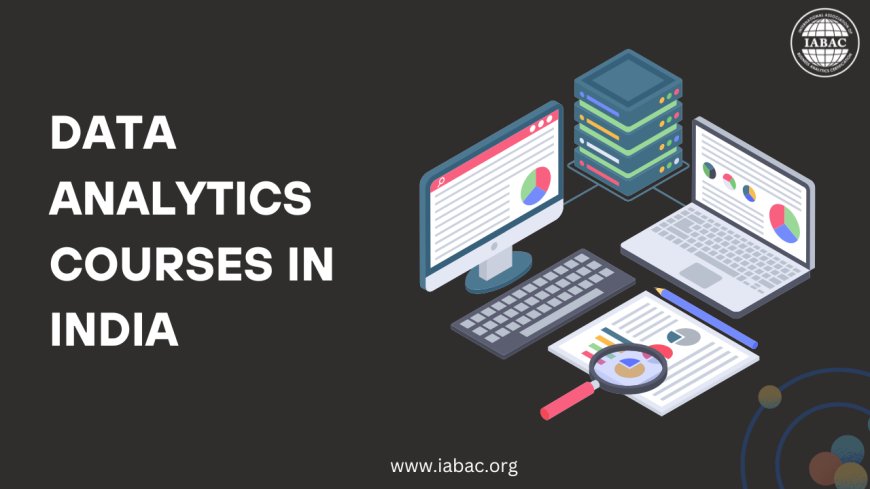Data Analytics Courses in India
Explore top data analytics courses in India. Gain skills in data analysis, visualization, and machine learning for lucrative career opportunities.

Data analytics is becoming important across various industries because it helps transform raw data into meaningful insights. This field uses techniques from statistics, computer science, and information technology to analyze and interpret complex datasets. Industries such as healthcare, finance, retail, and technology apply data analytics to optimize operations, predict market trends, enhance customer experience, and improve efficiency.
In the job market, skills in data analytics are increasingly sought after. Professionals who are proficient in these skills are well-positioned for roles that require analyzing and responding to data-driven challenges. This demand includes specialized positions like data scientists and analysts, as well as sectors where decision-making relies on data insights. As businesses continue to focus on data-driven strategies, the importance of data analytics skills in the job market is expected to grow.
Why pursue data analytics in India?
In India, the rise of a technology-focused economy has increased the need for data analysts. These professionals play a key role in interpreting data that helps drive business decisions across various sectors such as technology, finance, healthcare, and e-commerce. Data analysts are vital because they manage complex data, use it to solve problems, and predict future trends.
For those interested in this field, data analytics can lead to diverse job roles, including those of data scientists, business analysts, and data engineers. Each role deals with different aspects of data, from gathering and storing it to analyzing and presenting findings. The growth in data-driven industries in India means that there are many opportunities for career advancement. As companies increasingly depend on informed, data-driven decisions, the significance of data analysts in shaping business strategies grows, offering them chances to progress rapidly in their careers.
Types of Data Analytics Courses Available in India
In India, individuals looking to develop skills in data analytics have a range of educational courses to choose from. These courses are designed to cater to various levels of expertise and career stages. Options include certificate programs, which are short courses that focus on specific skills or tools in data analytics. Diploma programs offer a broader curriculum that typically lasts a few months to a year, providing a more comprehensive understanding of the field. For those seeking a deeper, foundational education in data analytics, bachelor’s and master’s degree programs are available. These degree programs are more extensive and cover a wide range of topics over several years, preparing students for advanced roles in the industry.
When it comes to the mode of delivery, both online and in-person options are available for these courses. Online courses offer flexibility and convenience, allowing learners to balance their studies with other commitments and access materials from anywhere.
In-person courses, on the other hand, provide the traditional classroom experience with direct interaction with instructors and peers, which can be beneficial for hands-on learning and networking. Both formats have their unique advantages, catering to different learning styles and needs.
Essential Elements of a Data Analytics Course
A comprehensive data analytics course is designed to equip students with both theoretical knowledge and practical skills essential for the field. Here are the key components that such a course typically includes:
-
Statistical Methods: Courses start with basic statistics, such as means, medians, and modes, progressing to complex inferential statistics that involve hypothesis testing and regression analysis. These methods are crucial for interpreting data and deriving meaningful insights.
-
Machine learning: This includes both supervised and unsupervised learning techniques. Students learn to build models using algorithms for classification, regression, clustering, and dimensionality reduction. Practical exercises often include real-world datasets to develop predictive models.
-
Data Visualization: Students learn to create impactful visual representations of data using tools like Tableau and Power BI. The course covers principles of good visualization practices, such as choosing appropriate chart types and using color effectively to communicate information clearly and efficiently.
-
Data Management: This involves techniques for acquiring, cleaning, and organizing data, ensuring its quality and usability for analysis. Topics include data integration, transformation, and storage, as well as dealing with missing data and outliers.
-
Big Data Technologies: Introduction to platforms and frameworks such as Hadoop, Spark, and NoSQL databases that are used to process and analyze large datasets beyond the capability of traditional database systems.
The software and tools covered in these courses include:
-
Python: is often emphasized for data manipulation and analysis due to its powerful libraries like Pandas for data frames, NumPy for numerical data, and scikit-learn for machine learning.
-
R: is taught for its strong statistical capabilities and data visualization packages such as ggplot2.
-
SQL: is essential for extracting and handling data stored in relational databases.
-
Excel: is used for basic data tasks and introductory analytics.
-
Visualization Tools: Training on tools like Tableau for creating dashboards and Power BI for business intelligence solutions.
Criteria for Choosing the Right Data Analytics Course
Evaluate the comprehensiveness and relevance of the curriculum. Ensure it covers key areas such as data mining, machine learning, and statistical analysis, aligning with industry standards and your learning objectives.
-
Faculty Expertise: Research the qualifications and experience of the teaching staff. Look for instructors with practical industry experience and expertise in data analytics to ensure high-quality instruction and mentorship.
-
Hands-on Opportunities: Consider the availability of hands-on learning experiences, such as projects, case studies, or internships practical application of concepts is crucial for developing skills and preparing for real-world challenges in data analytics.
-
Certification Value: Evaluate the reputation and recognition of the certification awarded following course completion. Look for certificates from respected institutions or organizations that the industry's employers recognize and esteem.
Tips on Selecting Based on Personal Career Goals and Academic Background:
-
Alignment: Choose a course aligned with your career aspirations, whether it's data science, business analytics, or another specialization.
-
Specializations: If you have specific career goals, opt for courses offering specialized tracks or concentrations that cater to your interests.
-
Assessment: Assess your proficiency in relevant subjects like mathematics or programming to determine if the course suits your academic background.
-
Feedback: Seek feedback from professionals or alumni to understand the course's effectiveness and real-world applicability.
Career Prospects After Completing the Course
Upon completing the course, graduates can explore roles such as software developer, data analyst, marketing analyst, or project manager, aligning with their specialization. These positions span various industries and sectors within the Indian job market, promising avenues for career progression and professional development.
Regarding salary expectations, entry-level positions typically offer annual packages ranging from ₹3-6 lakhs, while mid-level roles can command between ₹6-15 lakhs per annum. Seasoned professionals with extensive experience may secure senior positions with salaries surpassing ₹15 lakhs annually. Notably, the job market in India is witnessing significant growth in the technology, healthcare, finance, and sustainability sectors, indicating promising opportunities for skilled individuals in these domains.
graduates can explore diverse roles like software development, data analysis, and project management after completing their courses, with salary ranges varying based on experience and industry. Encouragingly, the data analytics field in India offers promising career prospects, with growing demand across sectors. Pursuing a career in data analytics presents exciting opportunities for professional growth and contribution to the evolving landscape of technology and business.











































